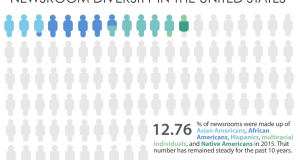It’s been a rocky month for the journalism industry.
Within the first half of August, journalists were laid off by the hundreds, media investments were withdrawn, papers were bought and sold and a new digital media venture celebrated its first year — with promising ratings.
Marc Cooper, a professor at the University of Southern California’s Annenberg School of Journalism, is unfazed.
“It’s been some years now that news business has been going through a revolutionary transformation,” Cooper said.
Part of this transformation has involved the acquisition of two national newspapers, The Boston Globe and The Washington Post, both being purchased by men are who have little to no experience working in journalism.
“It’s not just a small or even medium-sized shakeup, and these changes that we’ve seen at The Washington Post are not just a series of anecdotes,” Cooper said. “These are symptoms of a revolution and it’s a digital revolution, and in all revolutions, all order is destroyed before the new order is consolidated.”
Along with the newspaper purchases there was a slew of layoffs from Gannett Co., and from AOL, which laid off about 500 employes from its local news unit, Patch.
“I think that it was an ill-conceived idea from the beginning,” Cooper said about Patch. “Many of us thought what they called ‘hyperlocal’ was a magic bullet, and it turned out that it wasn’t, or it isn’t. I think they went into Patch sort of blind.”
A memo released by AOL CEO Tim Armstrong when Patch was acquired by his company in 2009 stated that he hoped to fill the local “white space” in their services with the hyperlocal news organization. Emphasizing the attempt to serve the needs of communities left unserved with the demise of small local papers.
They were not alone in this effort to localize. MSNBC also hopped on the hyperlocal news train by purchasing the now defunct Everyblock.com, and Google at one point was in talks to buy Yelp. It seemed as though many companies were \trying to get in on that “magic bullet” for the industry.
Not everyone thinks Patch was ill-conceived. Cooper’s colleague, USC Annenberg School of Journalism professor Dana Chinn said it’s perfect for Los Angeles, in many ways a loose confederation of neighborhoods loosely tied together by the notion of being a city.
“I think Patch has a place, especially in a place like Los Angeles, that does not have that kind of hyperlocal news.”
“When I was with the L.A. Times,” Chinn said, “we did this zoning study and just because it was more convenient and less expensive, we’d put Los Angeles with something like 13 zones. Well if you know anything about Los Angeles, there are probably more like a hundred zones. Why? Because it was more convenient from a distribution standpoint.”
—
What has also made August a noteworthy month for journalism was because for the first time in a long time, despite the repetitive fall of the guillotine in the background, there have been
shifts in the revolution. Two national newspapers, The Boston Globe and The Washington Post, were purchased by gentlemen with no experience working in journalism.
News of the acquisitions have drawn a range of reactions from the journalism community with many decrying the Globe and Post’s new owners’ inexperience in newspapering and expressing worry about conflicts of interest.
“I guess I would be among the minority of folks who were not so upset that he bought it,” Cooper said. “I’d be happier if (Bezos) had not said that he does not intend to interfere with the editorial process. I think he should very much interfere with the editorial process.”
As Cooper said, he very well may be with the minority in his beliefs. One only has to look to California’s Orange County Register to see the controversy surrounding a new owner — in this case entrepreneur Aaron Kushner — getting involved with the editorial process of a paper.
The Register recently announced that its publisher, Freedom Communications, would be the broker for all the advertising in Anaheim’s new transportation hub. Many have said that this crosses the ethical boundary between the government and media groups that act as watchdogs.
And the debate is likely to continue.
“Even Kushner’s harshest critics at places like the Columbia Journalism Review will say that this is definitely an experiment in new lines being drawn” said Adam Elmahrek, a reporter at Voice of OC, a nonprofit that competes with the Register. “There are some people who agree with Kushner’s contention that this is just a new twist on traditional advertising.”
Timeline:
Aug. 1: Gannett Co. lays off hundreds of employees.
Aug. 3: Owner of the Boston Red Sox, John W. Henry, purchases The Boston Globe for $70 million.
Aug. 5: Amazon co-founder Jeff Bezos buys The Washington Post for $250 million.
Aug. 13: San Francisco Chronicle takes down its four-month-old paywall.
Aug. 13: Huffpost Live turns 1.
Aug. 15: Berkshire Hathaway drops Gannett stock and invests in Dish Network.
Aug. 16: AOL announces layoffs nearing the 500 for its local news division, Patch.
 VOICES Publishing from the AAJA National Convention
VOICES Publishing from the AAJA National Convention







